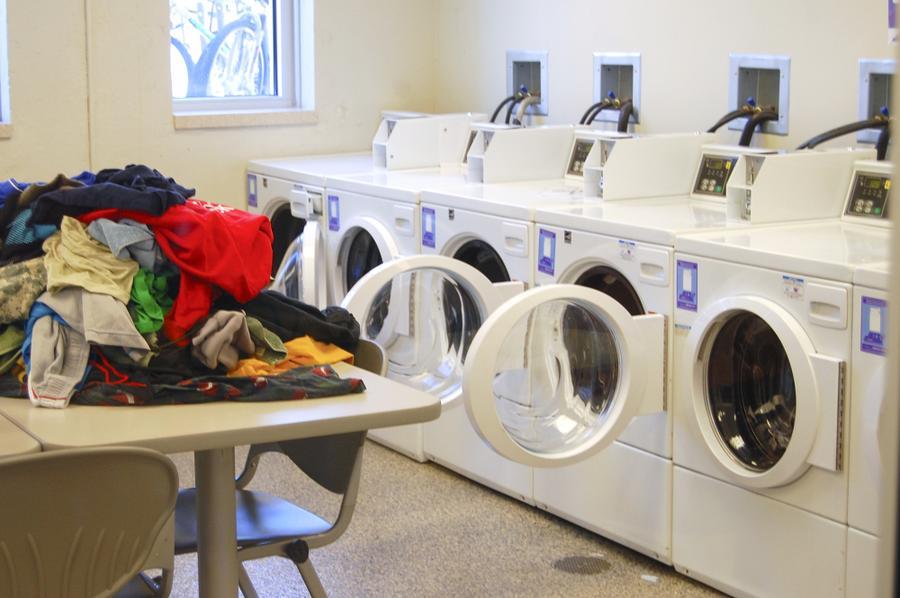Students who live in residence halls will no longer need to save quarters or swipe their cards to wash their clothes.
Beginning this year, students who live in residence halls are charged a flat fee that will allow unlimited use of the washers and dryers in the halls. Instead of paying $1.25 for each washer and dryer load, students are charged $50 per semester and do not pay each time they use their student IDs to activate machines.
Last semester, the Residence Halls Association advocated for the switch, with input from students in halls. Victoria Lee, last year’s chairwoman of RHA’s Residential Living committee, said the committee was advocating on behalf of students who were frustrated with the per-load charging system that was previously in place.
“A lot of residents were getting very irritated about having to collect quarters to do laundry or have to use the student charge to do any laundry, and we really felt strongly that laundry is a part of living somewhere,” she said. “I am not sure I would rent out an apartment if laundry services cost additional money.”
Students in residence halls were notified of the change in an email from the Department of Residential Life on Aug. 5. According to the email, students who do at least five loads of laundry a month will save money with the new system.
Freshman Monica Dunn, who is a MOVE Magazine reporter, said she likes the new flat-rate system because it will save her money throughout the year.
“I feel like for us residents, it’s cheaper in the long run, and then it’s OK to do two loads with your lights and darks,” she said. “You don’t have to worry about cost because it’s unlimited.”
The new system may give some students an incentive to do their laundry more frequently.
“I like it a lot. It means I can do my laundry a lot more than if I just had ‘a buck-25’ for everything,” freshman Mac Whaley said.
Former Mark Twain Hall President Caiden Webb, who has been living in the residence halls since last year, said the new system is saving him a significant amount of money on laundry.
“I think it is much more economical because I did upwards of $30 of laundry per week,” he said.
The decision to charge $50 came from several different groups, including RHA, ResLife and university administration. Lee said the committee looked at the prices at other area colleges and the number of loads a student would need to do per month for a flat fee to benefit them.
The amount takes into account not only an estimate of how many loads each student will do a semester, but also for some updates to older and broken washer and dryer units as well as adding new ones within more populated buildings.
“[The new and updated machines] should be a lot better better than the ones we had last year,” Lee said.
The new system also includes a feature called Wash Alert, which can notify students the status of their washer and dryer loads via email or text.
While many students in residence halls do their laundry in the halls, students whose family or friends live nearby may not. Since each student has the fee automatically added to their room and board, they have to pay the $50 whether or not they will use it.
Freshman Devesh Kumar is from Columbia and said he will be doing laundry in his hall because of the new system, but would have done it at home if he could have opted out of the fee.
“It doesn’t really bother me, but it bothers my parents because since we live here we can do our laundry at home and we won’t have to pay the money, even though we still have to pay the $50 when it really isn’t needed,” he said.
Lee said despite attempts by the Residential Living committee to allow students to opt out of the flat fee, they were unable to put it in the contract between ResLife and the company that provides the laundry service.
A potential problem with the flat fee could be students swiping to allow their nonresident friends to use the laundry.
Lee said that the Residential Living committee considered this issue while deliberating the change, but decided after talking to other universities with flat rates that the act of bringing laundry from off campus to the halls, especially because a resident needs to swipe a card to enter the building, is inconvenient enough to deter nonresidents from doing laundry in halls.
“It is just as much of an inconvenience for people to bring their laundry to a residence hall as it is for you to bring your laundry home to do it,” Lee said. “It’s just kind of a hastle.”
MU spokesman Christian Basi said the new system will be examined regularly to evaluate costs.
“We’re excited about the new system and hope our students will use the system wisely,” Basi said in an email. “We will review the costs on a regular basis and determine if we need to make any changes based on use.”
After the Residential Life committee dedicated time to the issue last year, Lee hopes to see residents more content with doing laundry in the halls.
“As a committee, it is something that we pushed for the entire year and it was quite the accomplishment, I think, to actually get this changed,” Lee said. “We are hoping that it goes well this school year and all of the school years to come and that people are happy with their laundry services because last year I know people were not happy with their laundry services.”
_Edited by Emily Gallion | [email protected]_








